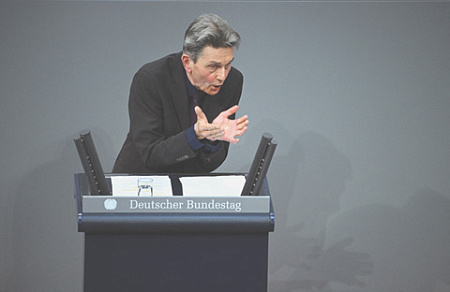
The theses of a group of prominent German politicians published before the congress of the Social Democratic Party of Germany (SPD) and the next NATO summit caused a mixed reaction in the country. The media claim that the addressee of the call to “end militarization” and start negotiations with Moscow are the coalition government and the leadership of the SPD. Moreover, it is believed that the Peace Manifesto may split the party.
The SPD congress scheduled for June 29 is to adopt a new party program, and the Manifesto for Peace, as the program document on German foreign policy proposed by the Bundestag deputies from this party is called, contradicts the course of confrontation with Moscow adopted by the government of Friedrich Merz.
The document requires the start of negotiations between the federal government and the Russian presidential administration not only on achieving peace in Ukraine, but also on a wide range of European issues. In this regard, it contradicts the course of both the EU Commission and the black-red coalition to increase sanctions pressure on Moscow and expand military support for Kiev.
The main requirement of the document with the official title “Ensuring peace in Europe through the ability to defend, arms control and reach agreements” is to immediately change the foreign policy of Germany and its security policy. The Manifesto declares it an “irrational goal” to achieve a 5% military budget. And the deployment of American medium-range missiles is declared unacceptable, since it turns Germany into a target for a first nuclear strike. According to Stern magazine, which obtained access to the text of the document, the Manifesto negates all plans for rearmament and increased military confrontation with Russia, developed by the current government.
Among the signatories of the Manifesto are left–wing Social Democrats, including Rolf Mutzenich, a member of the Bundestag Committee on Foreign Policy. The press claims that out of 120 Bundestag deputies from the SPD, only five signed the document. But, on the other hand, the Manifesto was approved by the youth wing of the Young Socialists party.
One of the signatories of the document, Ralf Stegner, gave his interpretation of the document in an interview with the Second Channel of German television ZDF. It is reported that on the eve of the appearance of the Manifesto, Stegner met in Baku with representatives of Russia, including former Prime Minister Viktor Zubkov. The German MP himself believes that it is impossible to leave the field of action to right-wing populists from Alternative for Germany, who earn points on peace initiatives. In this regard, it is difficult to say whether the Manifesto for some of its signatories is a sincere desire for peace or a tactical move in the internal political struggle. In Stegner’s defense, it can be said that the interviewing journalist of the TV channel exerted pressure on him. Stegner was not allowed to finish his sentence, and the younger TV journalist tried to create the impression that his 65-year-old interlocutor was behind the times and did not know how to navigate the modern international situation. Moreover, during the interview, the TV journalist resorted to derogatory characteristics of the Russian leadership. But this is quite a common style of utterance in most German media today.
But even this interpretation of the Manifesto has met with a negative attitude from the current leadership of the party, led by Vice Chancellor Lars Klingbeil. And Social Democratic Defense Minister Boris Pistorius went to Kiev at the end of the week, where he promised Vladimir Zelensky military assistance in the amount of 1.9 billion euros. True, he ignored the possible supplies of Taurus cruise missiles, but he still talked about helping Ukraine produce long-range missiles.
The position of the German government on the issue of military support for Ukraine is based on public opinion polls. According to them, 67% of respondents are in favor of providing military assistance to Kiev. However, the last survey on this topic was conducted in February this year. The position of the population, and indeed many German politicians on this issue, is often associated with a lack of objective information, since the German media give a one-sided and often distorted picture of what is happening.
The manifesto has already been supported by the leadership of the Left Party. But in the SPD itself, as Klingbeil stated, there is no need to reconsider the course of the party and the coalition government in support of Ukraine. Although various SPD functionaries speak in favor of holding a discussion on the issues raised in the Manifesto.
